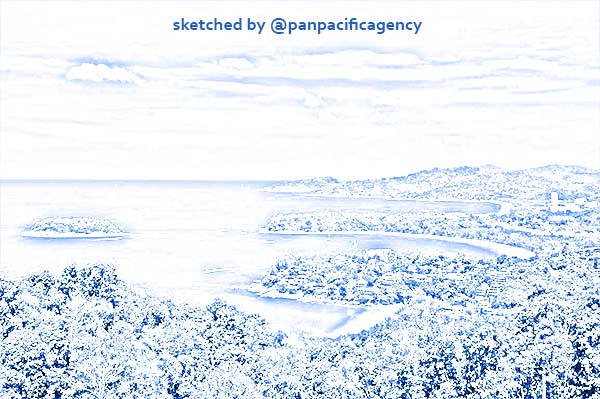Phuket resort outlook healthy: Global Resort Report

Kata, Kata Noi and Karon beaches attract millions of visitors annually to Phuket. Photo: Bangkok Post. Sketched by the Pan Pacific Agency.
BANGKOK, Dec 6, 2019, Bangkok Post. Buoyed by the rise of experience-driven travel and an affinity with locally inspired hotel offerings, resort assets remain a top target among investors, according to the international property consultancy JLL, Bangkok Post reported.
Resort sales accounted for 20% of all hotel sales in the Americas, and about 7% of the total in Asia Pacific, Europe, the Middle East and Africa (EMEA), according to the latest Global Resort Report by JLL Hotels & Hospitality.
Across all regions, private equity funds have emerged as the dominant buyer of resorts, accounting for 20-50% of annual resort transaction volume in each market.
In the Asia Pacific edition of the Global Resort Report, Phuket is one of the three hotel investment markets highlighted, along with the Maldives and the Gold Coast in Australia.
Resort transactions in Phuket were worth a total of 4.85 billion baht between 2014 and the first half of 2019, the report said. Investment activity over the period was dominated by foreign investors whose acquisitions accounted for 79% of the total value, with the largest amount of inbound capital coming from Singapore (58%).
Of the properties sold during the period, all of the sellers were Thais who were selling the assets to recognise investment returns.
Findings from JLL also show that developers were the most acquisitive group, accounting for over 65% of total transaction volume on the island, followed by hotel operators at 20%.
The report covers resort assets that are managed to meet industry standards by international or local resort and hotel operators, and excludes condotels. According to the JLL Hotels & Hospitality Group, the total stock of resorts in Phuket stood at 14,300 rooms at the end of June 2019. An estimated 540 resort rooms are planned for completion between the second half of 2019 and the end of 2021, accounting for less than 4% of the existing stock.
The upcoming new supply will mainly be in the upscale and luxury segments, namely the 189-room JW Marriott Phuket Resort & Spa Chalong Bay; the 150-room Melia Phuket Karon; the 101-room Melia Phuket Mai Khao and the 100-room Anayara Luxx Panwa.
Strong growth in tourism has contributed greatly to Phuket’s appeal as a hospitality investment destination. Total overnight visitors to the island have grown steadily over the past decade (2008-18), with international and domestic visits registering a compound annual growth rate of 10.9% and 9.9%, respectively. International overnight visitors accounted for 72.7% of total arrivals.
“In 2019, the number of international visitors to Phuket is likely to taper off slightly due primarily to the surging Thai baht and unfavourable global economic conditions,” said Pitinut Pupatwibul, senior vice-president (strategic advisory) with the JLL Hotels and Hospitality Group.
“However, investors have continued to show keen interest in acquiring quality resort assets in Phuket as they remain confident in the long-term outlook for the tourism market of one of the world’s most popular holiday destinations.
“In addition, increased air connectivity, lower barriers to entry through visa fee waivers and limited future supply are expected to bode well for Phuket’s resort segment in the medium to long term,” she added.
A proposal by Airports of Thailand to construct a new international airport in Phangnga to alleviate pressure in Phuket and Krabi would also bode well for resort demand on the island, said the report.
Looking at the market from a global perspective, “resorts have been star performers” over the past five years, said Lauro Ferroni, global head of JLL Hotels & Hospitality Research. “Given many consumers’ propensity for experiences over material goods, we anticipate continued investment activity in this sector globally.”
According to the Global Resort Report, international tourist arrivals are estimated to reach 2.2. billion in 2019, with a continued growth trajectory throughout the next decade, which will benefit resorts globally.